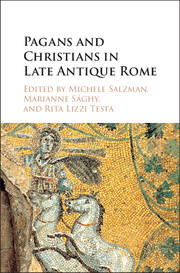 Pagans and Christians in Late Antique Rome
Pagans and Christians in Late Antique Rome Book contents
- Frontmatter
- Contents
- List of Illustrations
- Biographies of Authors
- Acknowledgments
- Introduction
- Part I SENATORIAL POLITICS AND RELIGIOUS CONFLICT
- Part II The Construction of New Religious Identities
- Part III Pagans and Christians: Coexistence and Competition
- Section A Pagans and Religious Practices in Christian Rome
- Section B Death and the Afterlife
- 12 Reinterpreting “Pagans” and “Christians” from Rome's Late Antique Mortuary Evidence
- 13 On the Form and Function of Constantine's Circiform Funerary Basilicas in Rome
- 14 Romanae gloria plebis: Bishop Damasus and the Traditions of Rome
- 15 Storytelling and Cultural Memory in the Making: Celebrating Pagan and Christian Founders of Rome
- Section C Reading Religious Iconography as Evidence for Pagan–Christian Relations
- Concluding Remarks: Vrbs Roma between Pagans and Christians
- Index
- References
14 - Romanae gloria plebis: Bishop Damasus and the Traditions of Rome
from Section B - Death and the Afterlife
Published online by Cambridge University Press: 05 November 2015
- Frontmatter
- Contents
- List of Illustrations
- Biographies of Authors
- Acknowledgments
- Introduction
- Part I SENATORIAL POLITICS AND RELIGIOUS CONFLICT
- Part II The Construction of New Religious Identities
- Part III Pagans and Christians: Coexistence and Competition
- Section A Pagans and Religious Practices in Christian Rome
- Section B Death and the Afterlife
- 12 Reinterpreting “Pagans” and “Christians” from Rome's Late Antique Mortuary Evidence
- 13 On the Form and Function of Constantine's Circiform Funerary Basilicas in Rome
- 14 Romanae gloria plebis: Bishop Damasus and the Traditions of Rome
- 15 Storytelling and Cultural Memory in the Making: Celebrating Pagan and Christian Founders of Rome
- Section C Reading Religious Iconography as Evidence for Pagan–Christian Relations
- Concluding Remarks: Vrbs Roma between Pagans and Christians
- Index
- References
Summary
Bishop Damasus of Rome (366–384) was called many names by many people, but nobody tagged him a ‘Romanizer’ despite his zeal in promoting both Christianity and the myth of Rome. The Liber pontifi calis dubbed him a Hispanic, and historians explored this path along with Damasus’ possible or symbolic associations with another great Spaniard of the time, Emperor Theodosius. Only recently did scholars turn to evaluating the bishop's achievement in a Roman context. Damasus’ struggles and programs – from primatus Petri to cultus martyru m – are indeed best explained as a creative recycling of Romanitas.In competition with passing time, with clerical and aristocratic rivals, the bishop sought to anchor his Church and his authority in distinctly Roman ‘national’ traditions.
Damasus’ exploitation of Rome 's non-Christian cultural capital in his epigram s exalting the martyrs was far from being an unthinking interpretatio christiana.The bishop adopted the aura of eternity derived from classical poetry to express the eternal glory of the Christian martyrs. His recourse to Roman models, however, stood for a sophisticated and subversive referencing of the past of the Vrbs that preserved as well as transcended Roman traditions. This paper proposes to examine Damasus’ carmina in the context of the late antique cultural revolution set into motion by Christian intellectuals. It focuses on a single but salient aspect of the Romanization of the martyrs by Damasus: their naturalization as Roman citizens. Concomitantly, the bishop literally tied the martyrs to the soil of Rome, thus inaugurating the catacombs as the distinctly Roman headquarters of the cult of the saints. The appropriation of the voice of Vergil in celebrating Christian heroes was Damasus’ ‘Ich bin ein Roman’-speech to his clergy, his fl ock and to the pilgrims, broadcasting in stereo that Roma aeterna was the Holy City of Christendom.
I. Christians and Classics
Damasus’ poetry constitutes a unique chapter in the history of Christian epigraphy. The bishop commemorated the martyrs in heroic hexameters carved with exquisite letters on marble plaques displayed in all over the catacombs of Rome. As a result of Damasus’ multi-media enterprise involving archaeological research, architectural renovation and artistic decoration, the Christian martyrs got to be exalted like classical heroes.
- Type
- Chapter
- Information
- Pagans and Christians in Late Antique RomeConflict, Competition, and Coexistence in the Fourth Century, pp. 314 - 329Publisher: Cambridge University PressPrint publication year: 2015
